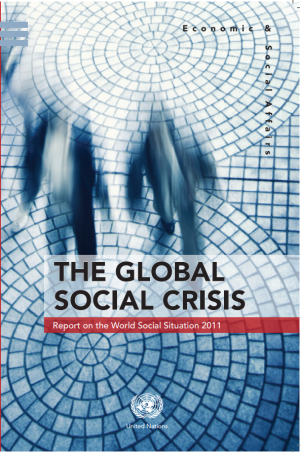The Report on the World Social Situation 2011: The Global Social Crisis, published by the United Nations Department of Economic and Social Affairs (UNDESA), finds many governments did not pay sufficient attention to the social implications of the global economic crisis. The report says economic policies considered in isolation from their social consequences often create dire results for people’s nutrition, health and education, which, in turn, adversely affect long-term economic growth.
“The economic crisis reminds us that it is essential for people to be healthy, educated, adequately housed and well fed to be more productive and better able to contribute to society,” said Jomo Kwame Sundaram, UN-DESA Assistant Secretary-General for Economic Development.
According to the report, the full impact of the crisis on social progress in areas such as education and health is not immediately clear and will only become fully evident over time. The increased levels of poverty, hunger and unemployment due to the global crisis will continue to affect billions of people for years to come.
The report states that during times of financial crisis, households often adopt coping strategies, such as changing spending patterns. However, these coping strategies can negatively influence education, health and nutrition, which may lead to lifelong deficits for the children affected and thus perpetuate poverty.
Increasing expenditure to expand social protection and improve access to education and health services, the report says, will help ensure more inclusive development with stronger domestic demand and a more solid foundation for future growth.
“There is renewed realization that social policy considerations, especially productive employment, must be given greater importance within economic policy,” Jomo said. “The disconnect between economic policies and their social consequences can create a vicious circle of slow growth and poor social progress”.
More about the 2011 Report on the World Social Situation: The Global Social Crisis
Austerity
Austerity measures in response to high government debt in some advanced economies are contributing to a more uncertain and fragile recovery, the report says. Increased pressure for fiscal consolidation and new pressures in response to such debt have severely limited fiscal and policy space in developed economies, it states, and many developing countries are also under pressure to cut public expenditure, undertake austerity measures, reduce the scope of government action and further liberalize labour markets.
As governments have shifted their economic recovery policies from stimulus measures to fiscal austerity, the report finds some countries have stalled or reversed social progress in several key areas. Cutting social expenditures, it says, may worsen and prolong negative impacts from the crisis, such as school dropout rates and unemployment.
Employment
Employment recovery clearly lags behind other indicators of economic recovery, and governments must continue to focus stimulus measures on job growth, the report states. The lag in employment recovery, it says, underscores the challenge posed by the crisis for poverty eradication and achievement of the Millennium Development Goals by 2015.
The report says the challenge of generating jobs should not be underestimated. The number of jobless persons has increased by 28 million since the beginning of the crisis. Moreover, governments around the world risk greater economic woes if they continue slashing budgets and social services at a time when greater job growth and social protections are needed most.
Social Protection
The report notes that the social consequences of the crises have been most severe in countries where social protection systems were weakest. Many countries adopted temporary social protection measures to cushion the impacts of the crisis at its onset, but the move towards fiscal austerity is constraining the ability of some to maintain their social protection budget.
The report says that social protection will boost the recovery, but it must also be viewed as ongoing investment to promote sustained, inclusive and equitable economic growth. Social protection systems are necessary to break the poverty cycle and reduce inequalities.
Panel Discussion on the The Social Impact of the Economic Crisis
Chapters of the Report
- Preface and Overview
- Chapter I: The Global Economic Crisis: Causes and Transmission
- Chapter II: The Great Recession and the Jobs Crisis
- Chapter III: Incomes, Poverty and Well-being
- Chapter IV: The Global Food Crises
- Chapter V: Crises, Fiscal Space and National Response
- Chapter VI: International Responses
- Bibliography
Press Release
UN News Centre: Social investments deserve priority in economic recovery schemes.
Listen to the UN-DESA Press Conference: Launch of the Report on the World Social Situation 2011 in Geneva on 22 June 2011.
- Mr. Kwame Sundaram Jomo, Assistant Secretary-General, UN Department of Economic and Social Affairs (DESA)
- Mr. Donald Lee, Chief, Social Perspective on Development Branch, Division for Social Policy and Development (DESA)
 Welcome to the United Nations
Welcome to the United Nations
